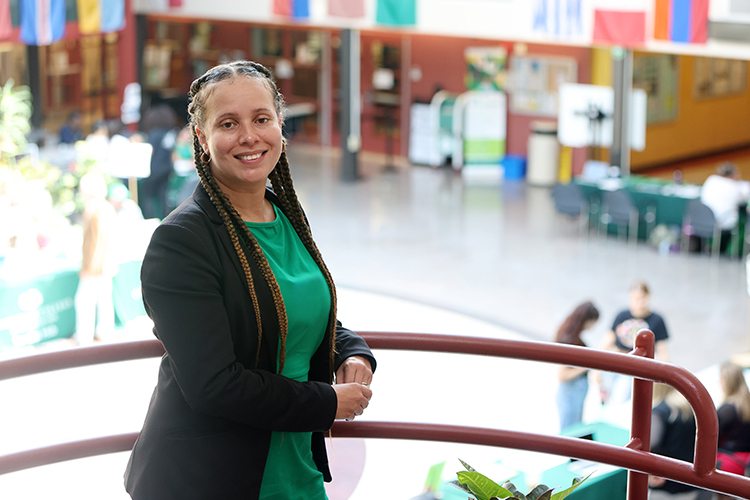Employee Spotlight: Maddie Burke

07/31/2024
Providence Campus leader and former Executive Director of Strategic Initiative has officially begun her new journey as the college’s first Dean of Career and Technical Education, Early College & Community Partnerships, a role in which she will work with regional higher education and K-12 partners to continue developing CCRI’s Early College initiatives.
A Boston, MA, native who grew up in Roxbury – the home of legendary R&B group New Edition, whom she’s a big fan of – Maddie considers herself a “city girl at heart” who has always felt a personal connection to the many students she serves through her work in the community. Prior to CCRI, Maddie spent 10 years at Year Up working to ensure equitable access to economic opportunity, education, and justice for young adults. Now she is heavily involved with CCRI’s Early College programs, such as Running Start, Accelerate, and High School Enrichment, which help high school students get a head start on their college education by earning free credits at CCRI.
Outside of that role, Maddie also helped launch the Benefits Hub, which offers students basic needs assistance, whether it’s putting food on the table or help with paying bills. As the new Dean of Career and Technical Education, she will also focus on community partnerships, which will allow her to expand her work with community agencies, municipalities, and other organizations that align with CCRI’s strategic initiatives.
Today, we take a look at what inspired Maddie to pursue a career in higher education and dive deeper into her goals as the new Dean of Career and Technical Education.
Growing up, were you always interested in a career in higher education?
I always wanted to work in education. My first job was as an afterschool tutor and I was a middle school social studies teacher for a short time. Eventually, I realized that I had a passion for working with adult students. I believe education and skills training is critical to realizing economic justice in this country, and that is what eventually drew me to higher education and specifically the Community College.
How much did your experience at Year Up help you hit the ground running when you joined the CCRI community?
Year Up was my introduction to workforce development and my work there taught me the importance of working closely with employer partners to understand skills gaps and build curriculum that helps students develop critical skills. Additionally, working with adults, and opportunity youth explicitly, allowed me to understand the need to build multiple pathways to educational and career success. At CCRI, I have had the opportunity to apply those lessons to serve students and the college’s strategic priorities.
A great deal of your work through the years has centered around increasing access to higher education and other resources for young adults and promoting a diverse, inclusive environment. What inspired you to focus on this work and does your experience as a student and educator help you connect with others on a different level?
I am a first-gen college student raised by a single mom who often worked multiple jobs to support our family. My mother’s hard work and perseverance was inspiring and it instilled in me a belief that everyone deserve access to education and economic mobility. It is that belief that moved me to become an educator and to work closely with opportunity youth.
As an undergraduate student, I worked two part-time jobs while attending school full time and now returning to graduate school as an adult I am balancing work, school, and raising a family. My own experiences as a student have given me insight into some of the challenges many CCRI students face and it helps me stay connected to our mission and focused on student success.
What are some of your goals as the new Dean of Career and Technical Education?
I am grateful and excited to have the opportunity to serve students and the college in this brand new role. I have examined several community colleges across the country and the exciting work they are doing in the CTE and Early College space. I look forward to collaborating with the rest of the workforce team to learn more and incorporate those best practices. A few immediate priorities are:
- Collaborate with employers to create and update CTE programs to meet current industry standards and workforce needs
- Partner with k-12 CTE programs to ensure there are comparable career pathways at the community college that lead directly to high-wage, high demand jobs
- Foster stronger relationships with local school districts to create early college pathways that ease the transition from high school to college and help students earn industry credentials



